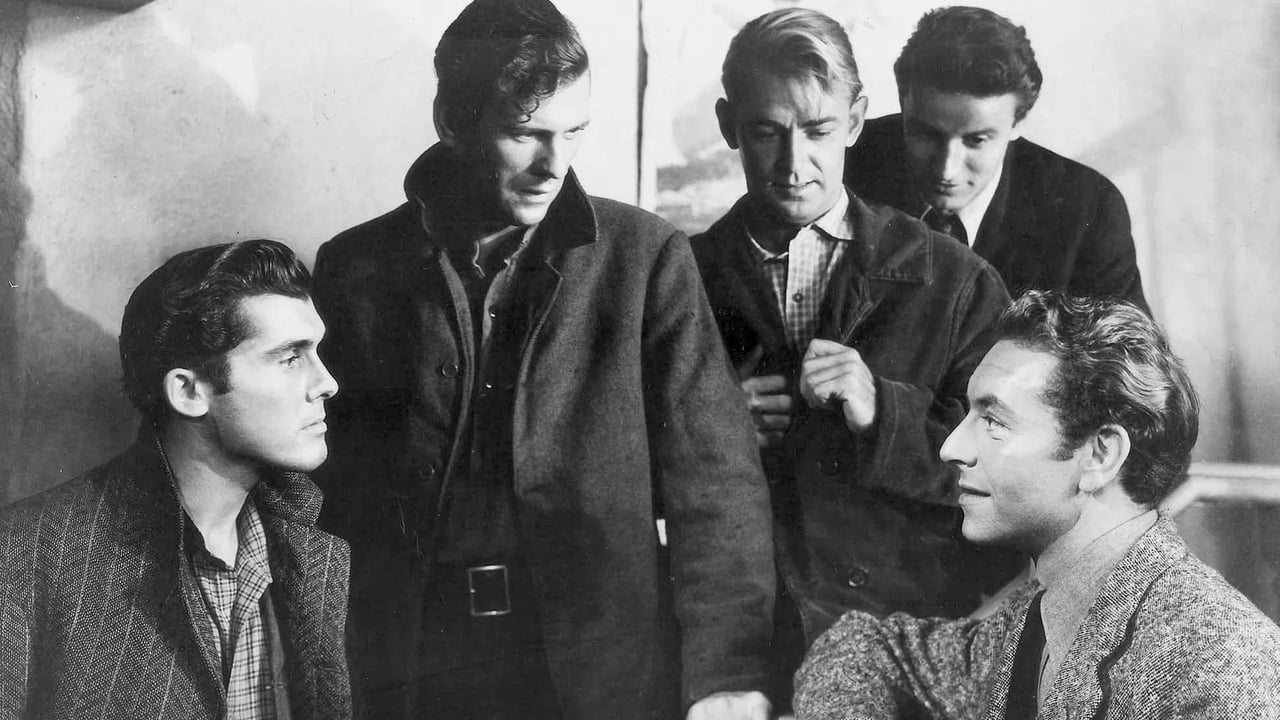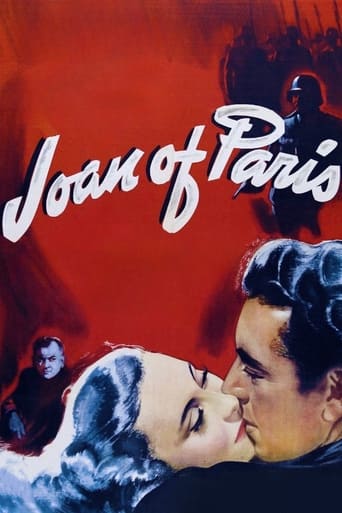LastingAware
The greatest movie ever!
PiraBit
if their story seems completely bonkers, almost like a feverish work of fiction, you ain't heard nothing yet.
Benas Mcloughlin
Worth seeing just to witness how winsome it is.
Blake Rivera
If you like to be scared, if you like to laugh, and if you like to learn a thing or two at the movies, this absolutely cannot be missed.
JohnHowardReid
Copyright 23 January 1942 by RKO Radio Pictures, Inc. New York opening at the Rivoli: 24 January 1942. U.S. release: 9 January 1942. Australian release: 27 August 1942. 8,400 feet. 93 minutes.
SYNOPSIS: Stranded in Paris, five Allied flyers - one of them badly wounded - attempt to escape the Nazis.NOTES: Hollywood debut (note that word "Hollywood", not "English language", not "American film") of Paul Henreid. English language debut of Michele Morgan. Alan Ladd's last film before This Gun For Hire catapulted him to major stardom.COMMENT: After a dramatically inventive opening (utilizing stock footage and the finger-doll chorus from The Gay Divorcee singing "Don't Let It Bother You" by Harry Revel and Mack Gordon), the film starts in fine thriller style with a brilliant series of fast-action, silhouettes-in-the mist tableaux from cinematographer Russell Metty. Nor does the pace let up when the scene shifts to Paris and Michele Morgan is finally introduced. Although not over-flatteringly photographed, she gives a poignant performance which rivals both in intensity and power Laird Cregar's elegantly vicious Gestapo chief. A pity Paul Henried (yes, he does occasionally spell his name that way) cannot match either of these players in charismatic fascination. True he acts fairly convincingly, even with sincerity, but young Alan Ladd (admittedly in a showy role) runs rings around him. Alexander Granach (of Warning Shadows and Nosferatu fame) also has one of the best roles of his career here - as a postage stamp! Doubtless the scriptwriters thought up his wonderful piece of business with the handkerchief, the gun and the little girl, but he plays it admirably, like a sort of latter-day Louis Wolheim. We must also commend John Abbott who has an effective cameo as an about-to-be-executed spy.It's correct as some critics have commented that quite a few of the script's details don't quite ring true. We could even add to the list, for example the Bible that Mitchell brings to the cell looks remarkably thin for a Catholic Bible. And it's 99.9% unlikely that any priest - or even a bishop or cardinal - would recognize the obscure verses from Proverbs and Job that Abbott asks for (even though these do allow the writers to get in the obligatory Old Testament quotes that Hollywood films are famous for). I also marvel at Henreid's proficiency in Latin. Even a priest would be hard pressed to put words to paper with such celerity.Pay no mind to me. What if the script is full of holes? Stevenson's driving direction of the fast-paced plot leaves little time for reflection on these matters. And when Morgan, Ladd, Cregar, Abbott and company are on screen, and when that screen is flooded or shadowed with Metty's lights, and when the sets are so artistically atmospheric, there's simply no time, no inclination whatever, to dissect trivialities. I'm inclined to agree with Bennett (below).OTHER VIEWS: I love Joan of Paris. It's my favorite of all the pictures I've ever been connected with. - Charles Bennett.Michele Morgan's first American (and indeed English-language) film starts off rather inventively with a musical clip from Gay Divorcee cut into a blank screen with narration off-camera and some strikingly composed and lit images with Nazi soldiers shrouded by fog and a superbly lit sequence in a church with shadows and silhouettes atmospherically built up by a background of choral music. In fact the directorial and photographic imaginativeness does not fade until, oddly enough, the entrance of Miss Morgan herself. It's as if the director thought that once the stage was set for her and she was actually on-camera she would take the whole weight of the film on her shoulders, save for some assistance from the delightfully and suavely evil presence of Laird Cregar as the Gestapo chief and the late entrance of May Robson giving a rather exaggerated portrayal of a schoolteacher/spy (but they are neither in the film all that much). Miss Morgan is rather poorly and unattractively photographed too and it seems as if the scriptwriter has really had to scratch his head to provide her with enough dialogue to justify her star billing. She has a ridiculous little monologue to her patron saint (incidentally she speaks English perfectly with hardly the slightest trace of an accent) and shares a lot of unconvincing and highly implausible romantic dialogue with Paul Henried who has a sort of precursor (in two senses) of his role in Casablanca. Presumably Alan Ladd had already been picked for stardom in This Gun For Hire when this film was being made or edited which explains the large number of close-ups he enjoys for so small a part (and not very convincingly enacted either!). There is a nice study by Alex Granach who plays an almost comic Gestapo agent with the talents of a leech (the extended series of sequences in which Henried tries to lose him is almost comic and seems to have been treated in a somewhat ambivalent fashion by Stevenson). Art direction, music scoring as well as photography, are plus factors and the film has been realized on a sizable budget. - John Howard Reid writing as George Addison.
Neil Doyle
This little known film released the same year as CASABLANCA is a minor gem among Hollywood's wartime romances, teaming Paul Henried and Michele Morgan very effectively in the leads. Despite some odd casting choices (Thomas Mitchell as a French priest) or Henried as a French squadron leader based in England, it tells an absorbing espionage tale of the French resistance against the Nazis. Released by RKO, it seems more like one of the typical Warner Bros. melodramas popular at that time. Even some of the supporting cast seem like Warner contract players--notably John Abbot as a prisoner about to be executed and May Robson. A tale of one woman's noble sacrifice to aid members of an RAF squadron in their attempt to return to England, it holds the viewer with its shadowy B&W photography and creates an atmosphere suggesting a French village during World War II. Paul Henried is excellent as the man trying to rid himself of a Gestapo agent who "sticks to him like a postage stamp".
Other notable roles are filled by Laird Cregar, as a cunning Gestapo who snares Henried in his trap, and Alan Ladd as "Baby", one of the downed flyers who is injured. Ladd was on the brink of major stardom and his performance here shows why--it's a brief but memorable supporting role. Shortly after this film, he was signed for his star-making role in "This Gun for Hire".Well worth watching...an absorbing example of a well scripted and directed wartime espionage film with only an occasional false note that does no major harm to the movie. The scene with the children in the schoolroom lacks credibility throughout.
trpdean
This is a beautifully made, written and directed movie. Paul Henreid (you may remember him from Now Voyager lighting the two cigarettes for himself and Bette Davis - or in Casablanca as the Czech resistance figure with Ingrid Bergman whom she is helping to escape the Continent to fight again) is very moving and believable as a French squadron leader based in England with the Free French forces.Henreid always comes off well in European roles - he SEEMS foreign, very romantic in a rather exotic Continental manner.He and four other fighter pilots based in England were clearing the way for the first British bombing raids on Germany, when they were shot down over France. They are trying to return to England via Paris (where Henreid's childhood teacher is now the dean of a cathedral and may help) - but only if they can contact British intelligence agents whom they must first identify and try to locate. Even with the help of the British intelligence and French secret agents, they must then evade the Gestapo that haunts Henreid's path through Paris.Henreid meets and is harbored by Michelle Morgan playing the title character, and who only gradually comes to understand who Henreid is. The simplicity, modesty, and religious and romantic nature of her barmaid are shown so lovingly. She falls in love very quickly - yet this seems completely a part of this girl's makeup - throughout you sense the enormity of this one great thing in this girl of poverty who lives alone on the top floor, above the cafe, with her tiny shrine to Joan of Arc.The sets are astonishing - one feels as if one really is in Paris and one of its great cathedrals, in its sewers, its steam baths, its cafes.Henreid's attempts to lose the Gestapo agent (a "postage stamp" sticking to him) is suspenseful and imaginative - a wonderful game of cat and mouse throughout Paris to join his comrades.The movie is extremely and wonderfully romantic - the discourse of the two lovers - one doomed - is terribly moving and painful. I rented this one week, and could not resist renting it again when I entered the store.This is a wonderful and underrated movie.
Kirasjeri
I have no problem with the casting of Mitchell or Henreid as Frenchmen, or Hans Conreid as a Gestapo agent. This was a generally engaging story of Allied flyers hiding out in German-occupied Paris in World War Two and their attempts to escape aided by Joan, played by the lovely and charming Michele Morgan. Watch for a young Alan Ladd in a small role. Stealing the show is the great Laird Cregar as the chief Gestapo agent. Cregar was a superb actor, but he must have tired of all the evil people he was forced to play owing to his weight; Henreid would get the girl and he'd get slapped. Cregar, a young man, went on a crash diet that apparently lacked needed nutrients - he died suddenly. And it was a shock and great loss to Hollywood, and to us all.

